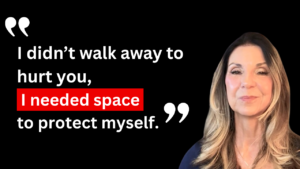Political differences have always been part of family life, but in today’s climate, these differences feel more divisive than ever. Political disparities, especially around hot-button issues, have created a wedge between family members, turning close bonds into strained or broken connections. In this post, we’ll examine why political views can drive such deep rifts in families and offer steps for rebuilding these relationships.
How Political Views Become Divisive in Families
Every family deals with differences in opinion, but political beliefs often touch on core values. Today’s polarized environment can make these disagreements feel deeply personal. Social media, selective news sources, and rapid cultural shifts have created an “echo chamber” effect, where people primarily hear viewpoints that reinforce their own. Within families, this can escalate political debates into conflicts over fundamental values, making it harder for family members to view each other as individuals rather than as opposing representatives.
Recent election cycles have been especially polarizing, with issues like immigration, social justice, and climate change triggering emotional responses. For many, each election cycle brings personally significant problems, making it difficult for families to separate their loved ones from their political beliefs. There is even more tension when family members feel judged or misunderstood by relatives who hold opposing viewpoints, leading to a breakdown in communication and, in some cases, estrangement.
When Family Bonds Break: Stories of Estrangement Due to Politics
Political disagreements sometimes go beyond heated debates and become catalysts for long-lasting estrangement. Research indicates that around 40% of Americans have ended a relationship over political differences, illustrating the scale of this issue. These breakups aren’t limited to friendships—many families experience estrangement, with siblings, parents, and even children cutting ties over conflicting beliefs.
For instance, one mother shared how her relationship with her adult child became strained due to differing views on climate policy. Another young man described how his decision to support a specific candidate led to a falling out with his parents. These stories reveal that when political beliefs are connected to deeply held values, they can drive a wedge in family relationships that feels hard to mend.
Steps to Understanding and Respecting Different Views
Rebuilding relationships strained by political divides requires a shift in approach. Here are some practical steps families can take to foster understanding and respect:
- Practice Active Listening: Listening without interruption or preparing a counterpoint allows family members to feel respected, even if they disagree. Instead of trying to “win” or change each other’s minds, focus on understanding why your loved one holds their views.
- Set Boundaries Around Political Discussions: For some families, avoiding politics during gatherings can help maintain harmony. By setting boundaries around specific topics, families can prevent unnecessary arguments and create a safer space for reconnection.
- Acknowledge Common Goals: Though opinions differ, many people share common goals, like wanting their families and communities to be safe, prosperous, and healthy. Recognizing these shared desires can make family members feel less polarized.
These steps can help family members see each other as individuals with complex beliefs rather than simply as representatives of a particular ideology. One of the most challenging obstacles is the assumption that one’s perspective is the only correct way to think and behave. Having solid opinions while respecting others and avoiding judgment and divisive language is possible.
Rebuilding Relationships After Estrangement Over Politics
For families already experiencing estrangement, reconnection requires patience and empathy. Start with small gestures that focus on mutual respect and a desire to reconnect rather than a need to resolve political disagreements.
Successful reconciliation often begins with a mindset shift; one does not need to convince the other party to accept their perspective on the rift. Many families initiate this conversation with an expression of care, like, “You are more important to me than our political differences. Let’s set this aside and focus on what brings us together.”
Here are some approaches to consider:
- Reach Out with Empathy: Express a genuine interest in reconnecting by focusing on shared memories or experiences instead of past points of conflict.
- Foster Positive Interactions: Plan gatherings or conversations centered on activities or topics both parties enjoy. These positive interactions build trust and gradually ease family members back into a relationship.
- Express a Willingness to Understand: Showing a desire to listen and understand without pressuring agreement can reduce defensiveness and demonstrate that the relationship is valued above political alignment.
When family members are open to discussing politics, doing so with empathy and curiosity rather than judgment can help ease tensions and prevent further estrangement. The goal is maintaining harmonious disagreement, which preserves relationships even when beliefs diverge.
The Value of Focusing on Common Ground
Family relationships often run deeper than political beliefs. Many families find that focusing on shared values—loyalty, kindness, and love—can help bridge political divides. For example, parents and children who disagree on current social issues might find common ground in family traditions, shared hobbies, or memories.
By shifting focus from points of contention to points of connection, family members can appreciate what they share rather than fixating on what divides them. While political issues may feel urgent, taking a step back to remember the love and shared experiences within a family can help create a foundation for rebuilding.
Conclusion
Political views can cause temporary rifts, but families can often heal and reconnect over time. Families can work toward restoring and strengthening their relationships by respecting each other’s perspectives, setting boundaries when needed, and focusing on love rather than differences. Though it may take time, patience, and a willingness to see beyond disagreements, family bonds can endure and thrive in a divided world.
If your family is navigating a political divide, remember that you don’t have to agree on everything to maintain a meaningful connection. Rebuilding isn’t always easy, but prioritizing empathy and understanding can help bring loved ones back together. Through compassion and respect, family members can find their way through political divides and into a place of connection and love.









